Pregnancy Related Skin Conditions
During pregnancy, various hormonal changes can impact the skin, leading to specific conditions that require specialized care. At Pinnacle Dermatology, our experienced team understands the unique challenges of pregnancy-related skin conditions, including melasma, pruritic urticarial papules and plaques of pregnancy (PUPPP), and gestational pemphigoid.
Melasma, often referred to as the "pregnancy mask," involves hyperpigmentation that causes dark patches on the face. PUPPP presents as itchy red bumps, typically appearing on the abdomen and spreading to the thighs and buttocks. Gestational pemphigoid is characterized by blistering and intense itching, which can be particularly uncomfortable for expectant mothers.
Our dermatologists at Pinnacle Dermatology offer personalized and safe solutions for these conditions, ensuring the well-being of both expectant mothers and their developing babies. We provide comprehensive treatments designed to manage symptoms, alleviate discomfort, and enhance the overall health of your skin during this special time.
If you're experiencing skin concerns during pregnancy, schedule an appointment at Pinnacle Dermatology for an expert evaluation and tailored care. Our specialized approach helps to maintain your skin's health and ensures you and your baby are well cared for.
Examples of Pregnancy Related Skin Conditions
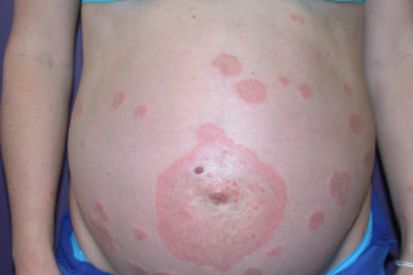
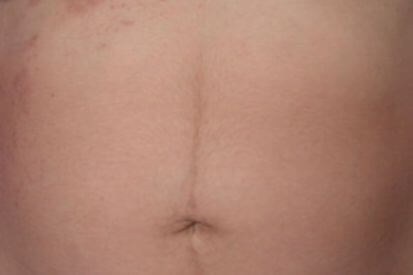
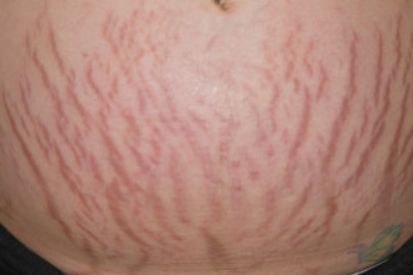
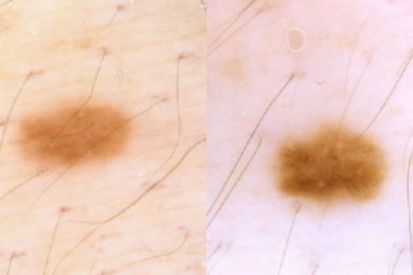
What are the Symptoms of Pregnancy Related Skin Conditions?
- Melasma (Chloasma)
- Hyperpigmentation on face, often referred to as "pregnancy mask."
- Dark patches or brown spots on the skin.
- Pruritic Urticarial Papules and Plaques of Pregnancy (PUPPP)
- Itchy red bumps or hives, usually on the abdomen.
- Spread to other areas of the body.
- Gestational Pemphigoid
- Blistering or urticarial rash, often around the abdomen.
- Itching and burning sensations.
What are the Causes of Pregnancy Related Skin Conditions?
- Hormonal Changes: Fluctuations in hormones, particularly estrogen and progesterone.
- Genetic Predisposition: Family history of skin conditions may increase susceptibility.
- Increased Blood Flow: Enhanced blood circulation during pregnancy can affect skin appearance.
- Immune System Changes: Altered immune responses during pregnancy may contribute.
- Stretching of Skin: Physical stretching of the skin as the abdomen expands.
- Unknown Factors: Some conditions may not have clearly defined causes during pregnancy.
How to Prevent Pregnancy Related Skin Conditions
Recognizing that each pregnancy is unique, with individual factors influencing skin conditions, consulting a dermatologist for personalized guidance and interventions tailored to specific concerns is recommended.
Pregnancy Related Skin Conditions FAQs
Pregnancy can bring various skin changes, including darkening of the skin (chloasma), stretch marks, and changes in moles. These are often due to hormonal fluctuations and increased blood flow.
Yes, acne can be more prevalent due to hormonal shifts. However, not all acne products are safe during pregnancy. Consult with a dermatologist to identify pregnancy-safe skincare to manage acne without harm.
Linea nigra is a common pigmentation line that appears on the abdomen during pregnancy. It's caused by hormonal changes and usually fades after childbirth.
While it's challenging to prevent stretch marks entirely, keeping the skin moisturized with creams and oils can help minimize their appearance. Dermatologists can recommend safe products for pregnant women.
Most skin treatments and cosmetic procedures are best avoided during pregnancy. Always consult with a dermatologist or healthcare provider before undergoing any procedures to ensure they are safe for you and your baby.
Mild itching is common due to stretching skin, but severe or persistent itching could be a sign of a liver condition called cholestasis. If concerned, consult a dermatologist or healthcare provider.
Watch: Break Free from Skin Struggles
How to Treat Pregnancy Related Skin Conditions
- For PUPPP, management includes topical ointments, antihistamines, and oral steroids, often resolving after childbirth.
- Prurigo of Pregnancy is treated with topical ointments, oral medications, antihistamines, or steroids, typically resolving within three months post-delivery.
- Pemphigoid Gestationis, featuring blistering lesions and severe itchiness, may require corticosteroids, antihistamines, or immunosuppressive drugs due to the risk of pre-term delivery and fetal health issues.
Featured Blogs

- General Dermatology
- Skin Care
- Chronic Skin Conditions
We asked one of our skin care professionals for tips on how to clear up acne. Here's what he had to say.
Read More
- Sun Safety
- Skin Care
- Cosmetic Treatments
Are age spots a natural part of aging? Though many of us in our 20s and 30s would like to think so, the reality is age spots (a.k.a liver spots) don’t just mean you’re getting older: they’re also a sign that your skin is getting too much sun exposure.
Read More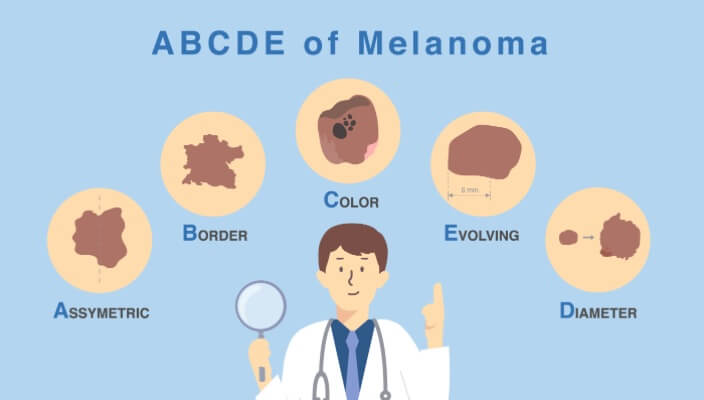
- Skin Cancer
- General Dermatology
- Skin Exams
Learn the ABCDEs of Melanoma, the deadliest form of skin cancer.
Read MoreFeatured Products for Pregnancy Related Skin Conditions

EltaMD Foaming Facial Cleanser 3.38 oz , 7 oz
Give your skin a fresh start with EltaMD Foaming Facial Cleanser. A gentle enzyme and amino acid blend loosens makeup, oil and other impurities on the skin and in the pores. The thick, rich foam gently cleanses leaving your skin feeling clean and balanced.

EltaMD Moisture-Rich Body Cream
EltaMD Moisture-Rich Body Crème infuses compromised and dry, flaky, sensitive skin with long-lasting moisture and essential nutrients. It is the ideal daily moisturizer to help achieve and maintain softer, smoother, healthy-looking skin. 8 oz / 226 g


